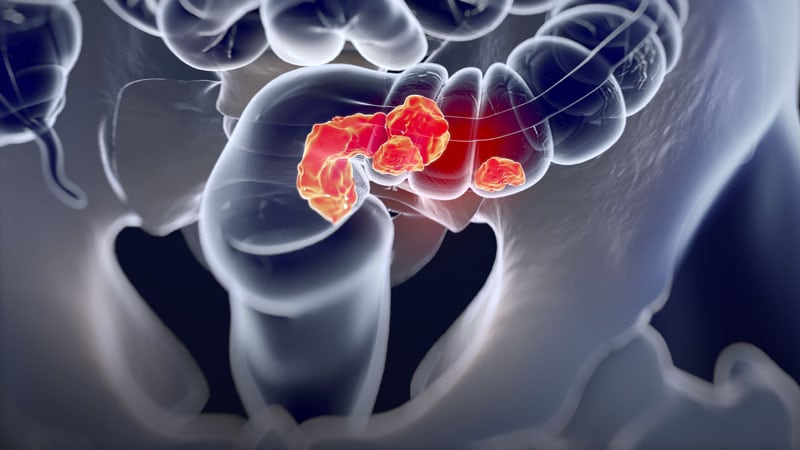Standard Therapy Outperforms Primary Surgery in Rectal Cancer Treatment
Core Concepts
Standard preoperative chemoradiation followed by surgery is more effective than primary surgery and adjuvant chemoradiation in treating locally advanced rectal cancer.
Abstract
TOPLINE:
- Standard preoperative chemoradiation followed by surgery is superior to primary surgery and adjuvant chemoradiation for locally advanced rectal cancer.
METHODOLOGY:
- Preoperative chemoradiation followed by surgery is the standard treatment for locally advanced rectal cancer.
- Preoperative MRI can help determine tumor involvement of the mesorectal fascia (MRF).
- A Chinese trial tested if patients with MRI-predicted negative MRF could skip preoperative chemoradiation.
TAKEAWAY:
- After a median follow-up of 34.6 months, the intervention group had 4.4% local recurrences compared to none in the control group.
- The 3-year disease-free survival rate was 81.8% in the intervention group and 85.4% in the control group.
- In the per protocol dataset, the primary surgery group had a 5.4% lower disease-free survival rate compared to the preoperative chemoradiation group.
IN PRACTICE:
- Primary surgery is an inferior strategy for locally advanced rectal cancer patients with high risk but negative MRF.
SOURCE:
- The study was published in the International Journal of Radiation Oncology, Biology, Physics on January 5, 2024.
LIMITATIONS:
- Limited sample size and patient crossover from neoadjuvant to primary surgery group.
- Short follow-up time for some patients.
DISCLOSURES:
- The study received no commercial funding, and the authors had no relevant conflicts of interest.
Customize Summary
Rewrite with AI
Generate Citations
Translate Source
To Another Language
Generate MindMap
from source content
Visit Source
www.medscape.com
Standard Therapy Beats Out Primary Surgery in Rectal Cancer
Stats
"After a median follow-up of 34.6 months, there were six (4.4%) local recurrences in the intervention group and none in the control group."
"In the intention-to-treat population, the 3-year disease-free survival rate was 81.8% in the intervention group vs 85.4% in the control group (hazard ratio [HR], 1.76)."
"In the per protocol dataset, the 3-year disease-free survival rate was 81.1% in the primary surgery group vs 86.6% in the preoperative chemoradiation group — a difference of −5.4% (HR, 2.02)."
Quotes
"This trial was shut down earlier due to an excessive number of [disease-free survival] and local recurrence events observed in the interventional group of primary surgery."
"Primary surgery is an inferior strategy, compared to preoperative [chemoradiation] followed by surgery, and cannot be recommended for [locally advanced rectal cancer] patients in clinical practice."
Key Insights Distilled From
by Megan Brooks at www.medscape.com 01-17-2024
https://www.medscape.com/viewarticle/standard-therapy-beats-out-primary-surgery-rectal-cancer-2024a100011e
Deeper Inquiries
What are the implications of these findings for current treatment guidelines
The findings of this study have significant implications for current treatment guidelines for locally advanced rectal cancer. The results clearly demonstrate that standard preoperative chemoradiation followed by surgery is superior to primary surgery and adjuvant chemoradiation in terms of disease-free survival and lower recurrence rates. Therefore, these findings suggest that current guidelines should continue to recommend the standard approach of preoperative chemoradiation followed by surgery for patients with locally advanced rectal cancer. Primary surgery should not be considered as a first-line treatment option based on the outcomes of this study.
Are there any potential long-term effects of preoperative chemoradiation that were not addressed in the study
While the study addressed the adverse effects of preoperative chemoradiation such as fecal incontinence and bowel/sexual dysfunction, there may be potential long-term effects that were not specifically addressed. Long-term effects of preoperative chemoradiation could include secondary malignancies, radiation-induced fibrosis, and long-lasting gastrointestinal issues. These potential long-term effects should be considered when weighing the benefits and risks of preoperative chemoradiation in the treatment of locally advanced rectal cancer.
How might the results of this study impact the decision-making process for patients with locally advanced rectal cancer
The results of this study will likely have a significant impact on the decision-making process for patients with locally advanced rectal cancer. Patients and healthcare providers will now have more concrete evidence to support the use of preoperative chemoradiation followed by surgery as the preferred treatment approach. Patients with locally advanced rectal cancer may be more inclined to opt for the standard treatment regimen knowing that it offers better disease-free survival and lower recurrence rates compared to primary surgery. Healthcare providers will also be more likely to recommend preoperative chemoradiation based on the results of this study, ultimately leading to improved outcomes for patients with locally advanced rectal cancer.
0
